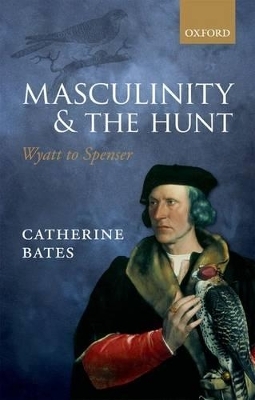
Masculinity and the Hunt
Wyatt to Spenser
Seiten
2013
Oxford University Press (Verlag)
978-0-19-965711-7 (ISBN)
Oxford University Press (Verlag)
978-0-19-965711-7 (ISBN)
Masculinity and the Hunt traces the imagery of the hunt in English literature of the sixteenth century, exploring a set of practices and motifs that are central to the culture of the period.
As an age-old metaphor for the sexual chase, the hunt provides a uniquely conflicted site for the representation of masculinity. On the one hand, hunting had from ancient times served to define a particular and culturally approved mode of masculinity as heroic, pursuant, and goal-oriented, where success was measured by the achievement of the objectives set: the capture and killing of prey. When applied to love, on the other hand, hunting was inflected quite differently. At first glance, the basic scenario of a male subject pursuing elusive quarry over which he ultimately comes to assert control might seem to epitomise the dynamic of the sexual chase, yet when poets invoke the hunt in an amorous context, this most obvious manifestation of the metaphor is not the one they put to use. On the contrary, in lyric poetry and romance, the hunt metaphor serves to demote or destabilise the masculine subject in some way. The huntsman is routinely a figure of failure: for all his efforts, he either fails to catch what he pursues, catches the wrong thing, ends up being caught by others, or runs round in circles chasing himself. His failure is measured precisely as a shortfall from the cultural ideal. The metaphor of the hunt thus opens up possibilities for exploring definitions of masculinity that deviate from culturally approved models of mastery and power. It shows how limited those models are and offers examples of alternative and counter-cultural versions of a masculine subjectivity that radically query patriarchal stereotypes of gender and class. The hunt has been the subject of increased critical interest over last few years, partly as a result of its politicisation as an issue, as reflected in recent changes to hunting legislation within the UK. Shifting attitudes to the hunt indicate that as a cultural phenomenon it continues to mobilise strong opinion and to activate notions of class and gender identity to this day. Masculinity and the Hunt is a unique study considering the link between hunting and masculinity in the literature of the sixteenth century.
As an age-old metaphor for the sexual chase, the hunt provides a uniquely conflicted site for the representation of masculinity. On the one hand, hunting had from ancient times served to define a particular and culturally approved mode of masculinity as heroic, pursuant, and goal-oriented, where success was measured by the achievement of the objectives set: the capture and killing of prey. When applied to love, on the other hand, hunting was inflected quite differently. At first glance, the basic scenario of a male subject pursuing elusive quarry over which he ultimately comes to assert control might seem to epitomise the dynamic of the sexual chase, yet when poets invoke the hunt in an amorous context, this most obvious manifestation of the metaphor is not the one they put to use. On the contrary, in lyric poetry and romance, the hunt metaphor serves to demote or destabilise the masculine subject in some way. The huntsman is routinely a figure of failure: for all his efforts, he either fails to catch what he pursues, catches the wrong thing, ends up being caught by others, or runs round in circles chasing himself. His failure is measured precisely as a shortfall from the cultural ideal. The metaphor of the hunt thus opens up possibilities for exploring definitions of masculinity that deviate from culturally approved models of mastery and power. It shows how limited those models are and offers examples of alternative and counter-cultural versions of a masculine subjectivity that radically query patriarchal stereotypes of gender and class. The hunt has been the subject of increased critical interest over last few years, partly as a result of its politicisation as an issue, as reflected in recent changes to hunting legislation within the UK. Shifting attitudes to the hunt indicate that as a cultural phenomenon it continues to mobilise strong opinion and to activate notions of class and gender identity to this day. Masculinity and the Hunt is a unique study considering the link between hunting and masculinity in the literature of the sixteenth century.
Catherine Bates is Professor of English in the Department of English and Comparative Literary Studies at the University of Warwick. She studied English at Oxford and was a Fellow of Balliol College, Oxford, and of Peterhouse, Cambridge, before moving to Warwick in 1995.
SHOOTING AWRY I; SHOOTING AWRY II
| Verlagsort | Oxford |
|---|---|
| Sprache | englisch |
| Maße | 148 x 222 mm |
| Gewicht | 560 g |
| Themenwelt | Sachbuch/Ratgeber ► Freizeit / Hobby ► Angeln / Jagd |
| Geschichte ► Allgemeine Geschichte ► Neuzeit (bis 1918) | |
| Geisteswissenschaften ► Sprach- / Literaturwissenschaft ► Anglistik / Amerikanistik | |
| Geisteswissenschaften ► Sprach- / Literaturwissenschaft ► Literaturwissenschaft | |
| Sozialwissenschaften ► Soziologie | |
| ISBN-10 | 0-19-965711-4 / 0199657114 |
| ISBN-13 | 978-0-19-965711-7 / 9780199657117 |
| Zustand | Neuware |
| Haben Sie eine Frage zum Produkt? |
Mehr entdecken
aus dem Bereich
aus dem Bereich
Europa 1848/49 und der Kampf für eine neue Welt
Buch | Hardcover (2023)
DVA (Verlag)
CHF 67,20
Giordano Bruno - ein ketzerisches Leben
Buch | Hardcover (2024)
C.H.Beck (Verlag)
CHF 41,85


